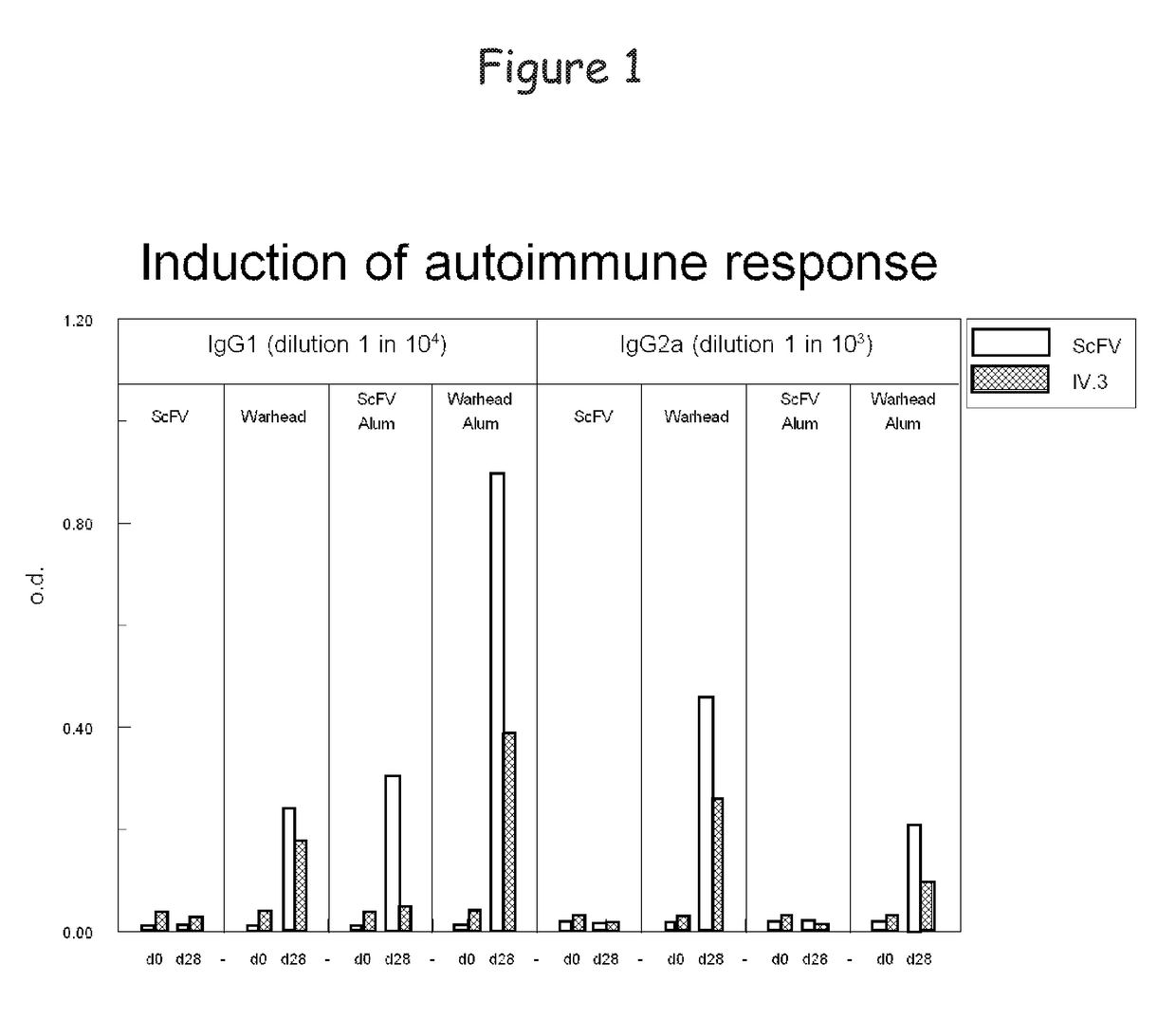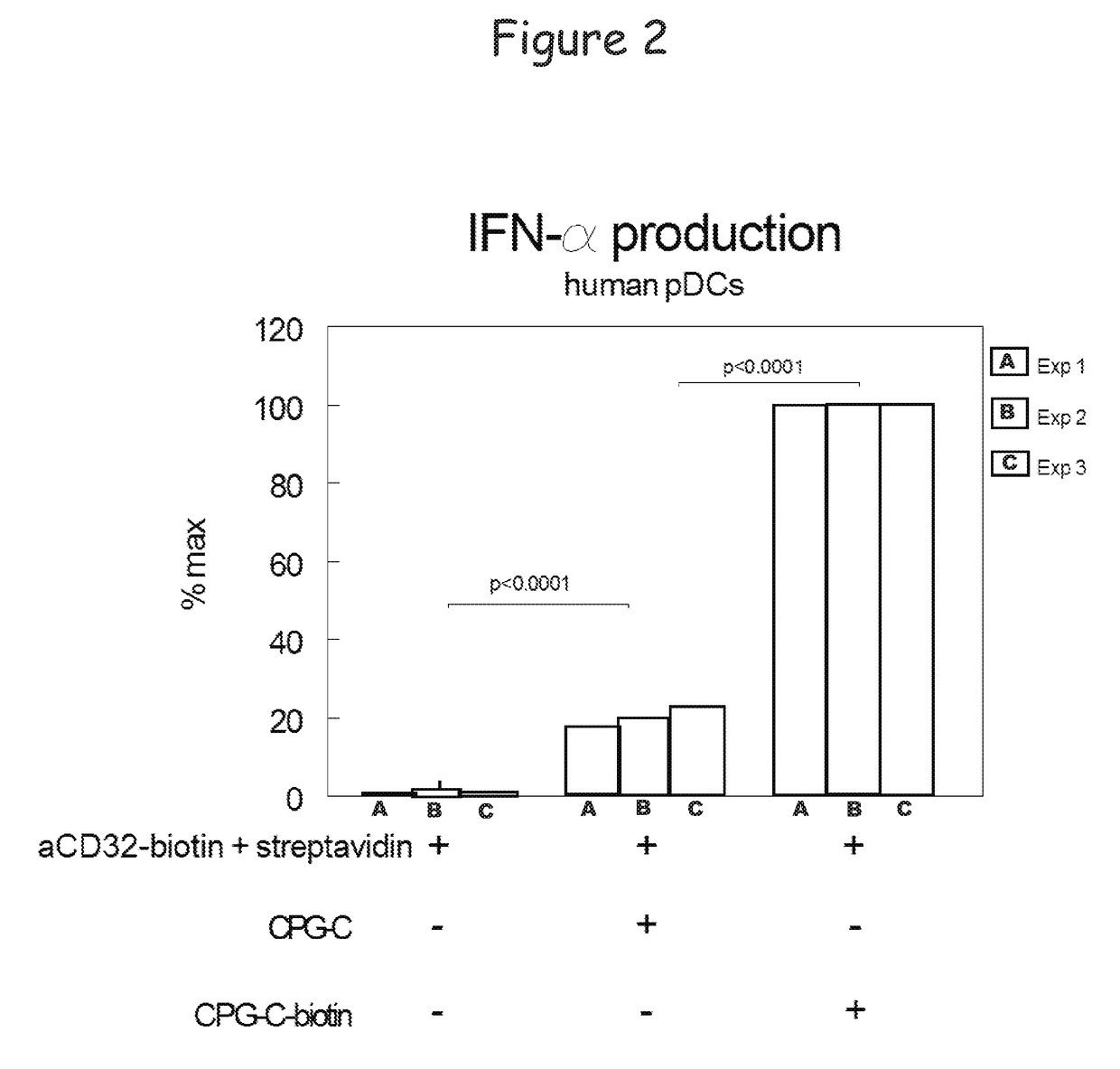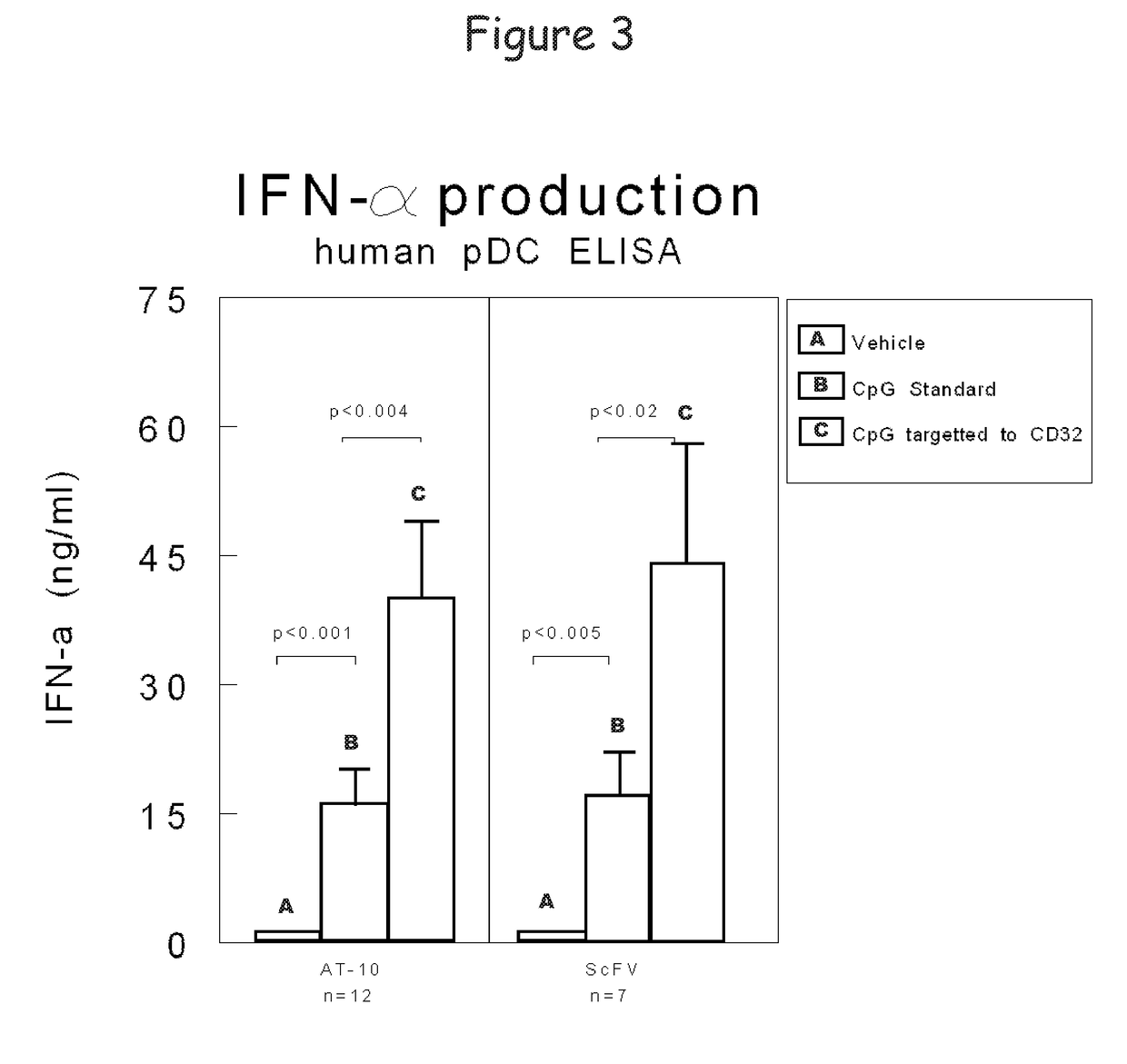Bispecific molecule binding tlr9 and cd32 and comprising a t cell epitope for treatment of allergies
a t cell epitope and bispecific technology, applied in the direction of cancer antigen ingredients, polypeptides with affinity tags, animals/human peptides, etc., can solve the problems of insufficient th1 memory response, so as to promote th1 cell development, prevent allergen presentation, and promote allergen presentation
- Summary
- Abstract
- Description
- Claims
- Application Information
AI Technical Summary
Benefits of technology
Problems solved by technology
Method used
Image
Examples
example 1
[0134]Panning of the human CL-phage library on a TLR-9 peptide e.g. sequence 216-240 of the mature protein TLR9 (SEQ ID No 3) in amino acid 1 letter code
ANLT ALRVLDVGGN CRRCDHAPNP C216 220 230 240
[0135]3 panning rounds shall be performed according to standard protocols. Briefly, the following method can be applied. Maxisorp 96-well plates (Nunc) are coated with the (synthetic) peptide representing part of the sequence of the TLR-9. For coating the peptides in the wells, 200 μl of the following solution are added per well: 0.1 M
[0136]Na-carbonate buffer, pH 9.6, with the following concentrations of dissolved peptide:
[0137]1st panning round: 1 mg / ml TLR-9 peptide
[0138]2nd panning round: 500 μg / ml TLR-9 peptide
[0139]3rd panning round: 100 μg / ml TLR-9 peptide
[0140]Incubation is for 1 hour at 37° C., followed by blocking with 2% dry milk (M-PBS) with 200 μl per well for 1 hour at room temperature. The surface display phage library is then allowed to react with the bound pe...
example 2
[0141]Cloning of Selected Clones of Human CL Mutants Selected Against TLR-9 for Soluble Expression
[0142]Phagemid DNA from the phage selected through the 3 panning rounds is isolated with a midi-prep. DNA encoding mutated CL-regions is batch-amplified by PCR and cloned Ncol-Notl into the vector pNOTBAD / Myc-His, which is the E. coli expression vector pBAD / Myc-His (Invitrogen) with an inserted Notl restriction site to facilitate cloning. Ligated constructs are transformed into E. coli LMG194 cells (Invitrogen) with electroporation, and grown at 30° C. on TYE medium with 1% glucose and ampicillin overnight. Selected clones are inoculated into 200 μl 2×YT medium with ampicillin, grown overnight at 30° C., and induced by adding L-arabinose to an end concentration of 0.1%. After expression at 16° C. overnight, the cells are harvested by centrifugation and treated with 100 μl Na-borate buffer, pH 8.0, at 4° C. overnight for preparation of periplasmic extracts. 50 μl of the periplasmic extra...
example 3
Human CL Mutants Selected Against TLR-9
[0143]Selected clones are assayed for specific binding to the TLR-9 peptide by ELISA.
[0144]Coating: Microtiter plate (NUNC, Maxisorp), 100 μl per well, 20 μg TLR-9 peptide / ml 0.1 M Na-carbonate buffer, pH 9.6, 1 h at 37° C.
[0145]Wash: 3×200 μl PBS
[0146]Blocking: 1% BSA-PBS, 1 h at RT
[0147]Wash: 3×200 μl PBS
[0148]Periplasmic extract binding: 50 μl periplasmic extract
[0149]50 μl 2% BSA-PBS, at room temperature overnight
[0150]Wash: 3×200 μl PBS
[0151]1st antibody: anti-His4 (Qiagen), 1:1000 in 1% BSA-PBS, 90 min at RT, 100 μl per well
[0152]Wash: 3×200 μl PBS
[0153]2nd antibody: goat anti mouse*HRP (SIGMA), 1:1000 in 1% BSA-PBS, 90 min at RT, 100 μl per well
[0154]Wash: 3×200 μl PBS
[0155]Detection: 3 mg / ml OPD in Na-citrate / phosphate buffer, pH 4.5, 0.4 μl 30% H2O2
[0156]Stopping: 100 ml 3M H2SO4
[0157]Absorbance read: 492 / 620 nm
[0158]Clones that give a high signal in this first, preliminary ELISA are cultured in a 20-ml volume at the same conditions as...
PUM
| Property | Measurement | Unit |
|---|---|---|
| temperature | aaaaa | aaaaa |
| pH | aaaaa | aaaaa |
| pH | aaaaa | aaaaa |
Abstract
Description
Claims
Application Information
 Login to View More
Login to View More - R&D
- Intellectual Property
- Life Sciences
- Materials
- Tech Scout
- Unparalleled Data Quality
- Higher Quality Content
- 60% Fewer Hallucinations
Browse by: Latest US Patents, China's latest patents, Technical Efficacy Thesaurus, Application Domain, Technology Topic, Popular Technical Reports.
© 2025 PatSnap. All rights reserved.Legal|Privacy policy|Modern Slavery Act Transparency Statement|Sitemap|About US| Contact US: help@patsnap.com



